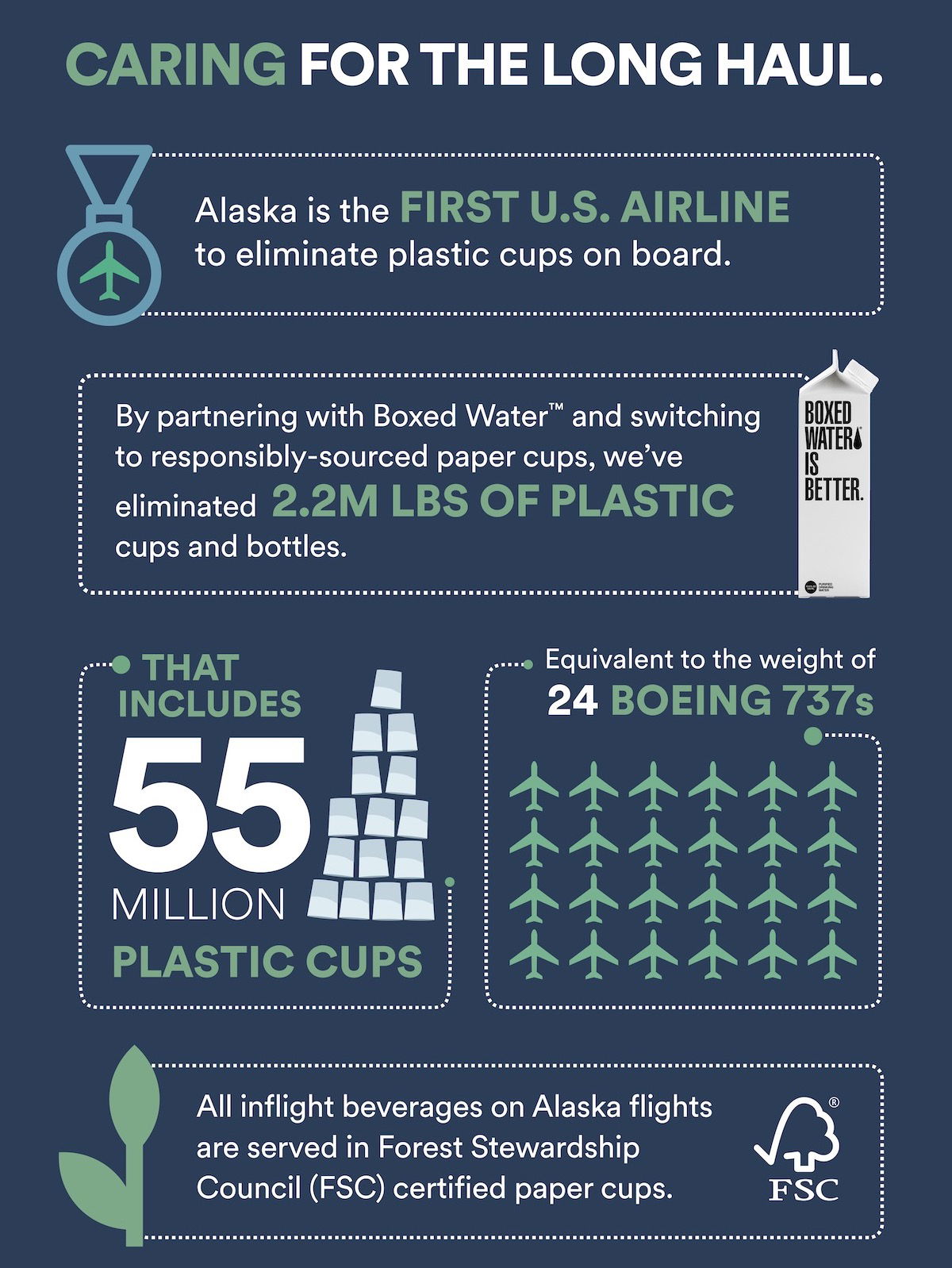Alaska Airlines has just become the first US airline to eliminate plastic cups onboard flights…
Alaska transitions from plastic to paper cups
Alaska Airlines has just completed its transition to paper cups for inflight beverages. This move will eliminate more than 55 million plastic cups annually, equal to the weight of 24 Boeing 737s (that’s a lot of weight!). All inflight beverages are now served in Forest Stewardship Council (FSC) certified paper cups in economy, and in reusable glassware in first class.

This is part of what has been a larger goal for the airline. In 2018, Alaska Airlines set out to eliminate its five largest sources of plastic waste. This initially started with removing plastic straws and stir sticks from inflight service, which was also a first for any US airline at the time. Then in 2021, Alaska eliminated bottled water onboard, instead replacing it with boxed water. That move alone eliminated 32 million plastic bottles per year.
By 2025, Alaska is hoping to replace its top five waste-producing items from onboard service, by pursuing product innovations and supply chain advancements.
Bottom line
In its latest environmental move, Alaska Airlines is eliminating plastic cups, instead replacing them with paper cups. Assuming the paper cups are of decent quality, I’d say that’s a great development, as it will save a lot of plastic.
Admittedly there’s never a perfect solution with this stuff, it’s just trying to find the best combination of what’s less terrible for the environment to begin with, combined with what’s easiest to recycle, all while not negatively impacting the customer experience as much as possible.
What do you make of Alaska transitioning from plastic to paper cups?





Less plastic cups on fold-down tables, more doors on seats. Win-win for everyone.
I can’t wait to enjoy a cocktail in a paper cup…..said no one ever.
While I agree with everything said earlier in this thread, I think one important point is missed: paper cups (let alone glasswere) are heavier than plastic cups, and therfore lead to more fuel burnt. So all in all a dumb move and a classic example of greenwashing unfortunately.
Weighed a 9 ounce plastic and a 9 ounce paper cup in our office on a postal scale. In this unscientific test, the plastic cup weighed .12 ounces and the paper one .13 ounces. 1/100th of an ounce difference in this random case. DV, I'm thinking this is significant. "Greenwashing," or just a comment from someone who doesn't know what they are talking about....
Part of my job is doing life cycle assessments (LCA) to evaluate the environmental impacts of new building products and the like. As a practitioner of LCA studies, I know that it's fairly easy to have an LCA study give the results that one wants. And comparing LCA studies to one another can lead to erroneous comparisons since there may be temporal, geographical, or temporal uncertainties in the studies. It's critical that the scope of...
Part of my job is doing life cycle assessments (LCA) to evaluate the environmental impacts of new building products and the like. As a practitioner of LCA studies, I know that it's fairly easy to have an LCA study give the results that one wants. And comparing LCA studies to one another can lead to erroneous comparisons since there may be temporal, geographical, or temporal uncertainties in the studies. It's critical that the scope of the LCA study, its limitations, and assumptions are well understood before making direct comparisons among competing products/alternatives.
That said, the best thing to do would be to find the original studies that any give "environmental superiority" claim is based on. Of course, it's important to know who also funded the studies.
So many fragile white men read this blog. They cant handle any change. If the airline used paper and announced a switch to plastic, they would be having the same meltdowns. Always anger anger anger anger.
Or, maybe when insecure non-white men can't handle a rebuttal... see how effin' racist that sounds? Why don't you reword your original comment, bud.
modern USA airlines . . .
Germany's best airline ever (airberlin) had that already way before they went bankrupt in 2017!
AS as always and well known, way behind the modern age time! :-) :-)
I didn't know so many recycle experts read this blog.
Can you provide some facts to contradict what people like Andy are saying? An ad hom isn't really useful for anyone. He makes a good point (and it's not controversial either in environmental initiatives): one needs to consider the total impact of any action, and not just some arbitrary point in the process or buzz words that sound good.
Yeah, experts are always reliable. Just like they were with the pandemic, snort! You ever heard the phrase, "I can't build a clock, but I know how to tell time"? It's a reference to the fallacy argument of expertise. One does not need be an expert to make a solid logical decision based upon widely available data.
The problem isn't about using plastic. It about recycling plastic.
People these day 'woke' and 'cancel' for all the wrong reasons.
The message AS is really sending is either a) paper cups are better for the bottom line or b) they are not properly recycling, like the rest of humanity.
What AS didn't tell you but you should be asking.
If 55 million plastic cups annually, equal to the weight of 24 Boeing 737s,...
The problem isn't about using plastic. It about recycling plastic.
People these day 'woke' and 'cancel' for all the wrong reasons.
The message AS is really sending is either a) paper cups are better for the bottom line or b) they are not properly recycling, like the rest of humanity.
What AS didn't tell you but you should be asking.
If 55 million plastic cups annually, equal to the weight of 24 Boeing 737s, then how many 737 does 55 million paper cups weight. Not really.
It should be what does weight have anything to do. I mean if they say they cut down an acre of trees so that 55 million cups can decompose in 20 years vs a byproduct of a petroleum process that would take much longer to decompose, but you need gas for your V12 trucks, so it's already there anyway.
And do most people even know what FSC certified really means?
You can get ordained for free online and be a certified minister at some weird church (freedom of religion at its finest).
Or you can simply get a Proposition 65 warning on anything, including the warning sticker itself.
Can we now cancel this woke madness?
Nothing says environmental theater quite like replacing plastic cups for lined paper. You think those trees magically teleport from the forest to the pulping mill? How about all those chemicals required to process the paper and make it water-tight? And let's be clear: landfills are not designed to decompose waste. Doesn't matter if it's plastic or paper. Efficient decomposition requires an aerobic environment, and landfills are not (instead, landfill waste produces methane as it decomposes)....
Nothing says environmental theater quite like replacing plastic cups for lined paper. You think those trees magically teleport from the forest to the pulping mill? How about all those chemicals required to process the paper and make it water-tight? And let's be clear: landfills are not designed to decompose waste. Doesn't matter if it's plastic or paper. Efficient decomposition requires an aerobic environment, and landfills are not (instead, landfill waste produces methane as it decomposes). Unless the airline is arranging for commercial composting of their products, "eliminating plastic waste" just means "creating paper waste." Don't get me wrong: we need to rethink packaging to reduce waste and improve recycling/reuse. However, without a holistic analysis of the waste stream, you are just swapping one bad option for another. For example, reuse a "single-use" plastic bag just once, and it has a lower environmental impact than any other bag (the worst, btw, are cotton tote bags). However, no politician won re-election by supporting the reuse of cheap, lightweight plastic bags.
'For example, reuse a "single-use" plastic bag just once, and it has a lower environmental impact than any other bag'
That just isn't the case though. Maybe where you live, the alternative bags are offered are not environmentally friendly. (I don't ever see cotton shopping bags offered because that hardly seems durable or practical for groceries)
But according to the UN, cotton bags need to be reused 50-150 times as well as being recycled or...
'For example, reuse a "single-use" plastic bag just once, and it has a lower environmental impact than any other bag'
That just isn't the case though. Maybe where you live, the alternative bags are offered are not environmentally friendly. (I don't ever see cotton shopping bags offered because that hardly seems durable or practical for groceries)
But according to the UN, cotton bags need to be reused 50-150 times as well as being recycled or incinerated in order to be comparable to single-use bags.
So if you use it for several years, it could still be advantageous. However, the most common types of shopping bags in Europe, the polypropylene bags, only need to be used 10-20 times to be comparable to single use bags. You claim that using a single-use bag once has a lower impact, but that would just take 10-20 to 20-40. And if you go to supermarket 4-5 times per week, you would only need to keep your bag for a month and a bit in order to equal your once-reused plastic bag.
Decomposing organic material creates methane gas. Divert the organic material to composting solves that issue. Paper doesn’t need chemicals to make them water tight. There is a wax coating, which is organic.
The data is showing that these paper cups, which have an interior liner, are difficult to recycle and actually worse for the environment than cups made of recycled and/or industrially-compostable plastics. Restaurant chains like Wendys are doing away with their paper cups in favor of plastic for this reason.
Maybe they are using compostable paper cups? That is what I use at home. They don't have a liner so you can't leave your drink overnight or it will start to leak, but seems fine for short term use like on planes.
@Jim Maybe, or maybe not, but if whether or not it's environmentally friendly hinges almost entirely on that fact, then Alaska Airlines should state it explicitly, since that's literally the point of this entire exercise? There really is a lot of snake oil in the green sector. Yes, we need to be greener, but many processes for producing "green products" is extremely dirty or energy intensive itself, and lets not even get started with carbon offset.
The first time I saw carbon offset credits for sale, I knew it was Grift 101. Hey, I'm pretty strict about recycling but I have no illusions about the reality that much of it ends up in landfill anyway. We just need to continually reduce our packaging. Small incremental steps do add up. But can everyone please drop the sanctimonious crap of environmentalism! The high priestess of climate change are full of crap. Maybe they...
The first time I saw carbon offset credits for sale, I knew it was Grift 101. Hey, I'm pretty strict about recycling but I have no illusions about the reality that much of it ends up in landfill anyway. We just need to continually reduce our packaging. Small incremental steps do add up. But can everyone please drop the sanctimonious crap of environmentalism! The high priestess of climate change are full of crap. Maybe they should reduce their own personal methane production by zipping their mouth on occasion.